Analysis of Safety Regulations in Nigeria's Refining Sector
VerifiedAdded on 2023/06/15
|61
|15761
|314
Report
AI Summary
This report examines the effectiveness of safety regulations within Nigeria's oil refining sector, highlighting the challenges arising from unethical practices, corruption, and operational failures. It investigates the impact of oil spills and gas flaring on agricultural productivity, health, and marine life. The study assesses existing safety regulations, including Occupational Safety and Health (OSH) standards and OPEC guidelines, and explores how global safety practices can be beneficial to Nigeria. The report also addresses issues such as bunkering, technical advancements, and the role of government oversight, while proposing recommendations for improved safety measures and regulatory frameworks to protect employees and the environment. This document is available on Desklib, where students can find a wealth of study resources and solved assignments.
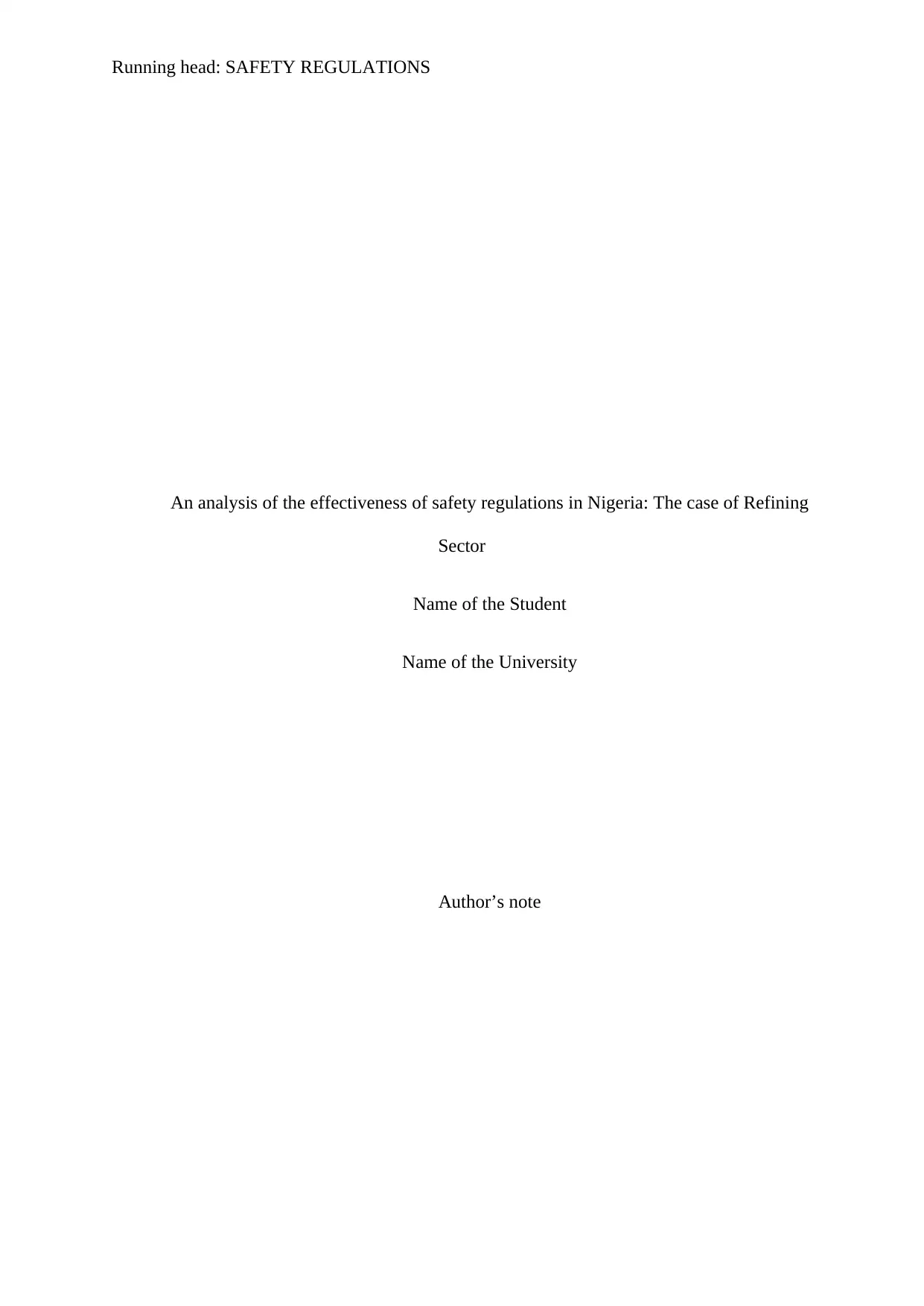
Running head: SAFETY REGULATIONS
An analysis of the effectiveness of safety regulations in Nigeria: The case of Refining
Sector
Name of the Student
Name of the University
Author’s note
An analysis of the effectiveness of safety regulations in Nigeria: The case of Refining
Sector
Name of the Student
Name of the University
Author’s note
Paraphrase This Document
Need a fresh take? Get an instant paraphrase of this document with our AI Paraphraser
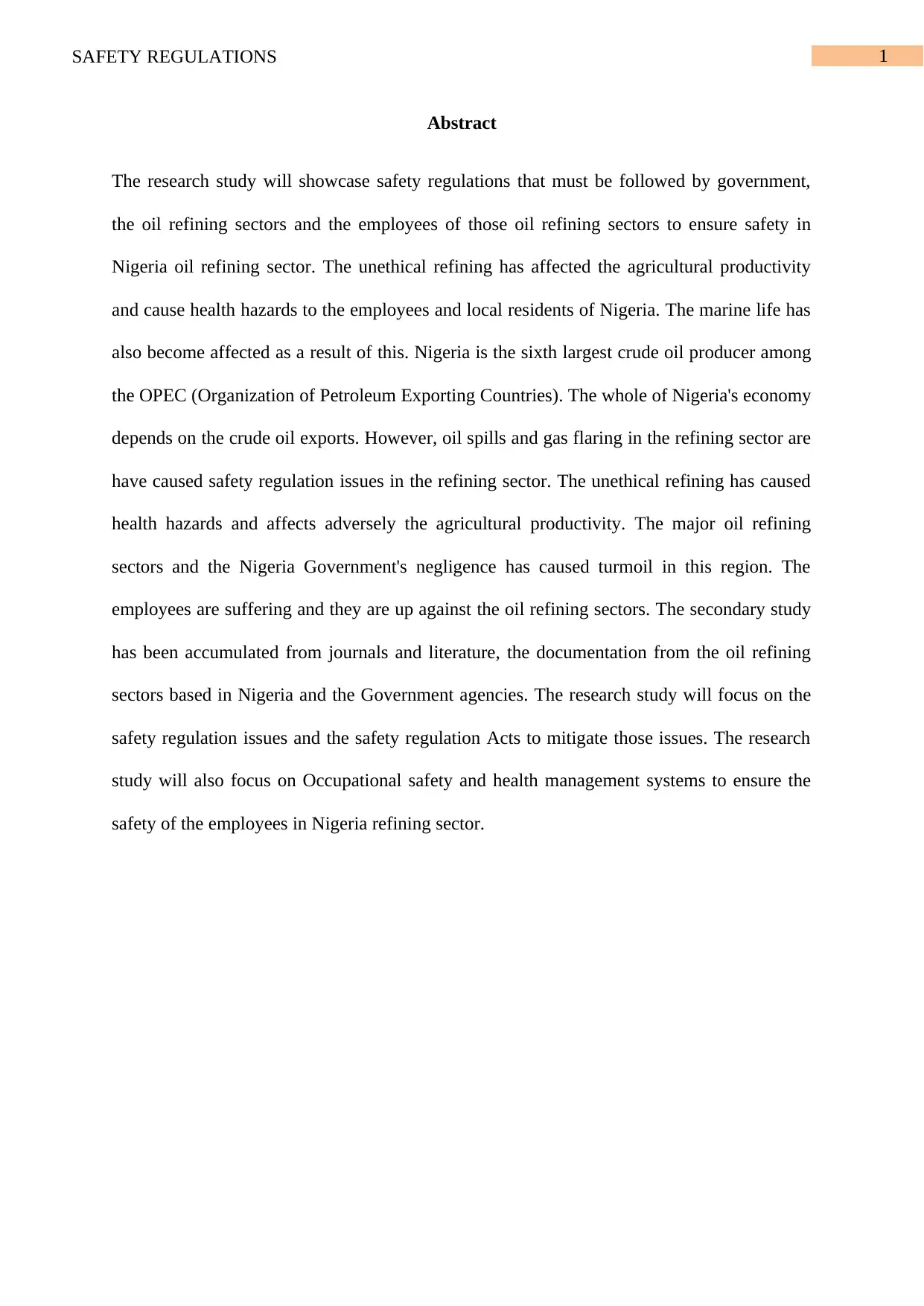
1SAFETY REGULATIONS
Abstract
The research study will showcase safety regulations that must be followed by government,
the oil refining sectors and the employees of those oil refining sectors to ensure safety in
Nigeria oil refining sector. The unethical refining has affected the agricultural productivity
and cause health hazards to the employees and local residents of Nigeria. The marine life has
also become affected as a result of this. Nigeria is the sixth largest crude oil producer among
the OPEC (Organization of Petroleum Exporting Countries). The whole of Nigeria's economy
depends on the crude oil exports. However, oil spills and gas flaring in the refining sector are
have caused safety regulation issues in the refining sector. The unethical refining has caused
health hazards and affects adversely the agricultural productivity. The major oil refining
sectors and the Nigeria Government's negligence has caused turmoil in this region. The
employees are suffering and they are up against the oil refining sectors. The secondary study
has been accumulated from journals and literature, the documentation from the oil refining
sectors based in Nigeria and the Government agencies. The research study will focus on the
safety regulation issues and the safety regulation Acts to mitigate those issues. The research
study will also focus on Occupational safety and health management systems to ensure the
safety of the employees in Nigeria refining sector.
Abstract
The research study will showcase safety regulations that must be followed by government,
the oil refining sectors and the employees of those oil refining sectors to ensure safety in
Nigeria oil refining sector. The unethical refining has affected the agricultural productivity
and cause health hazards to the employees and local residents of Nigeria. The marine life has
also become affected as a result of this. Nigeria is the sixth largest crude oil producer among
the OPEC (Organization of Petroleum Exporting Countries). The whole of Nigeria's economy
depends on the crude oil exports. However, oil spills and gas flaring in the refining sector are
have caused safety regulation issues in the refining sector. The unethical refining has caused
health hazards and affects adversely the agricultural productivity. The major oil refining
sectors and the Nigeria Government's negligence has caused turmoil in this region. The
employees are suffering and they are up against the oil refining sectors. The secondary study
has been accumulated from journals and literature, the documentation from the oil refining
sectors based in Nigeria and the Government agencies. The research study will focus on the
safety regulation issues and the safety regulation Acts to mitigate those issues. The research
study will also focus on Occupational safety and health management systems to ensure the
safety of the employees in Nigeria refining sector.
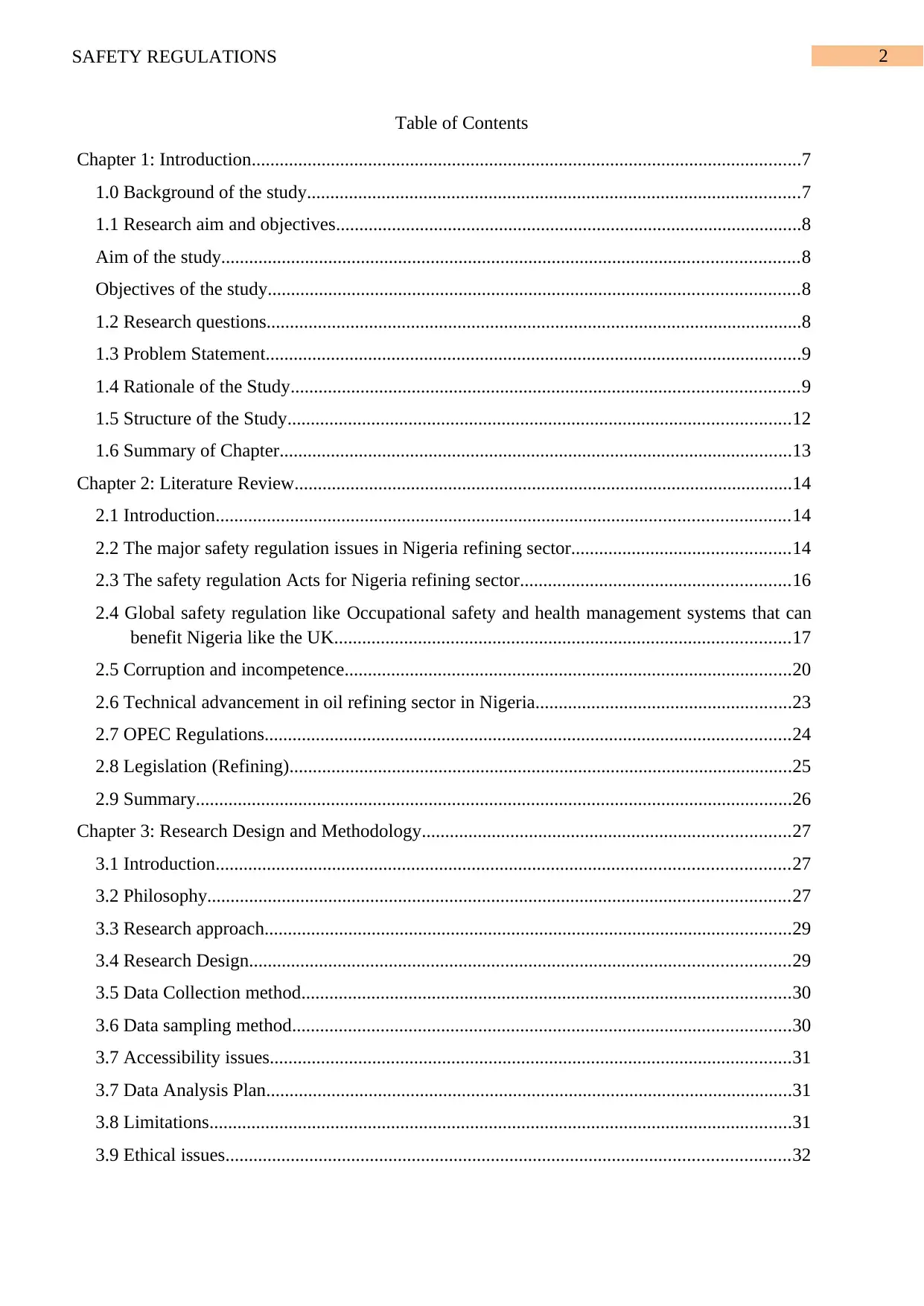
2SAFETY REGULATIONS
Table of Contents
Chapter 1: Introduction......................................................................................................................7
1.0 Background of the study..........................................................................................................7
1.1 Research aim and objectives....................................................................................................8
Aim of the study............................................................................................................................8
Objectives of the study..................................................................................................................8
1.2 Research questions...................................................................................................................8
1.3 Problem Statement...................................................................................................................9
1.4 Rationale of the Study.............................................................................................................9
1.5 Structure of the Study............................................................................................................12
1.6 Summary of Chapter..............................................................................................................13
Chapter 2: Literature Review...........................................................................................................14
2.1 Introduction...........................................................................................................................14
2.2 The major safety regulation issues in Nigeria refining sector...............................................14
2.3 The safety regulation Acts for Nigeria refining sector..........................................................16
2.4 Global safety regulation like Occupational safety and health management systems that can
benefit Nigeria like the UK..................................................................................................17
2.5 Corruption and incompetence................................................................................................20
2.6 Technical advancement in oil refining sector in Nigeria.......................................................23
2.7 OPEC Regulations.................................................................................................................24
2.8 Legislation (Refining)............................................................................................................25
2.9 Summary................................................................................................................................26
Chapter 3: Research Design and Methodology...............................................................................27
3.1 Introduction...........................................................................................................................27
3.2 Philosophy.............................................................................................................................27
3.3 Research approach.................................................................................................................29
3.4 Research Design....................................................................................................................29
3.5 Data Collection method.........................................................................................................30
3.6 Data sampling method...........................................................................................................30
3.7 Accessibility issues................................................................................................................31
3.7 Data Analysis Plan.................................................................................................................31
3.8 Limitations.............................................................................................................................31
3.9 Ethical issues.........................................................................................................................32
Table of Contents
Chapter 1: Introduction......................................................................................................................7
1.0 Background of the study..........................................................................................................7
1.1 Research aim and objectives....................................................................................................8
Aim of the study............................................................................................................................8
Objectives of the study..................................................................................................................8
1.2 Research questions...................................................................................................................8
1.3 Problem Statement...................................................................................................................9
1.4 Rationale of the Study.............................................................................................................9
1.5 Structure of the Study............................................................................................................12
1.6 Summary of Chapter..............................................................................................................13
Chapter 2: Literature Review...........................................................................................................14
2.1 Introduction...........................................................................................................................14
2.2 The major safety regulation issues in Nigeria refining sector...............................................14
2.3 The safety regulation Acts for Nigeria refining sector..........................................................16
2.4 Global safety regulation like Occupational safety and health management systems that can
benefit Nigeria like the UK..................................................................................................17
2.5 Corruption and incompetence................................................................................................20
2.6 Technical advancement in oil refining sector in Nigeria.......................................................23
2.7 OPEC Regulations.................................................................................................................24
2.8 Legislation (Refining)............................................................................................................25
2.9 Summary................................................................................................................................26
Chapter 3: Research Design and Methodology...............................................................................27
3.1 Introduction...........................................................................................................................27
3.2 Philosophy.............................................................................................................................27
3.3 Research approach.................................................................................................................29
3.4 Research Design....................................................................................................................29
3.5 Data Collection method.........................................................................................................30
3.6 Data sampling method...........................................................................................................30
3.7 Accessibility issues................................................................................................................31
3.7 Data Analysis Plan.................................................................................................................31
3.8 Limitations.............................................................................................................................31
3.9 Ethical issues.........................................................................................................................32
⊘ This is a preview!⊘
Do you want full access?
Subscribe today to unlock all pages.

Trusted by 1+ million students worldwide
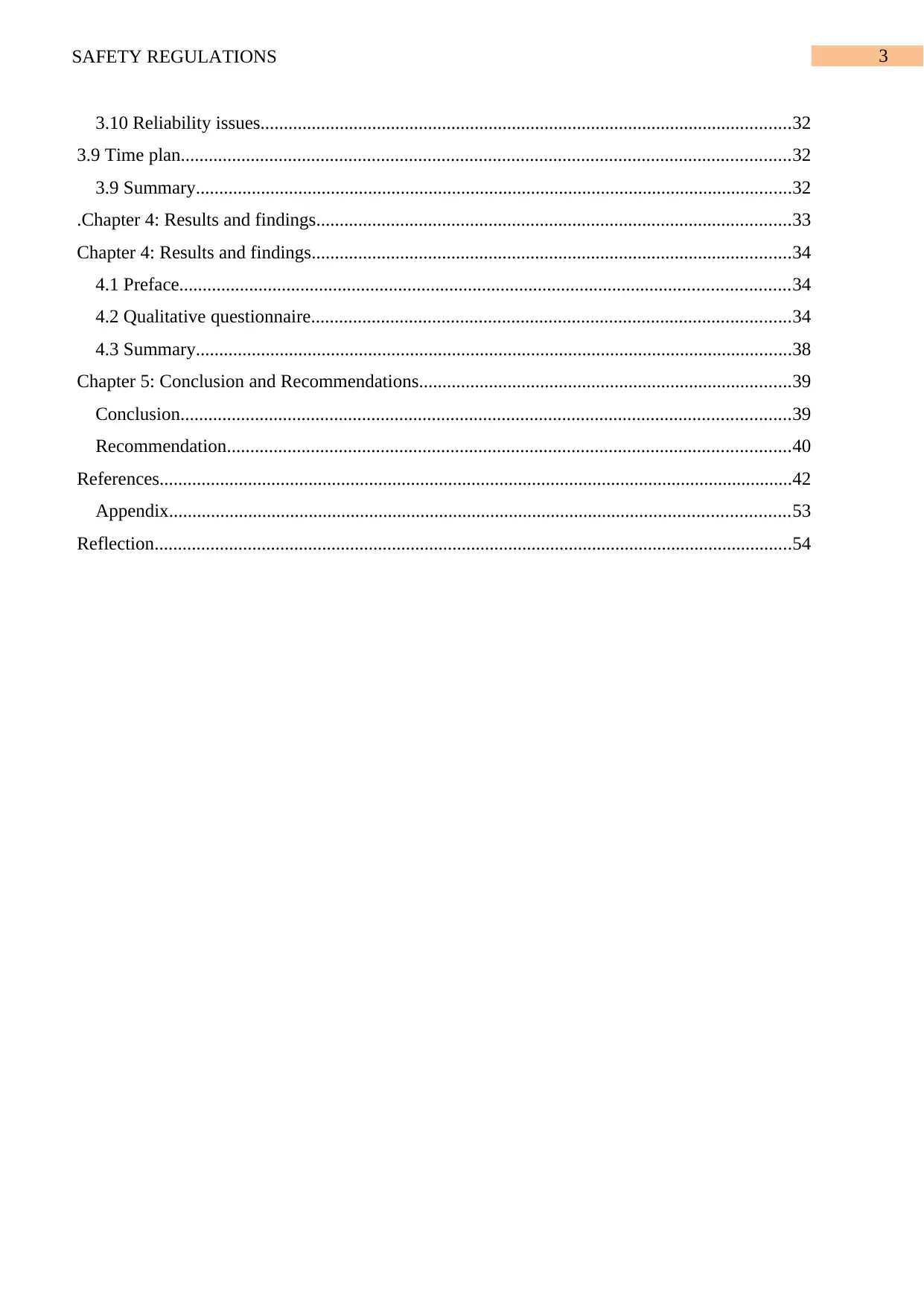
3SAFETY REGULATIONS
3.10 Reliability issues..................................................................................................................32
3.9 Time plan...................................................................................................................................32
3.9 Summary................................................................................................................................32
.Chapter 4: Results and findings......................................................................................................33
Chapter 4: Results and findings.......................................................................................................34
4.1 Preface...................................................................................................................................34
4.2 Qualitative questionnaire.......................................................................................................34
4.3 Summary................................................................................................................................38
Chapter 5: Conclusion and Recommendations................................................................................39
Conclusion...................................................................................................................................39
Recommendation.........................................................................................................................40
References........................................................................................................................................42
Appendix.....................................................................................................................................53
Reflection.........................................................................................................................................54
3.10 Reliability issues..................................................................................................................32
3.9 Time plan...................................................................................................................................32
3.9 Summary................................................................................................................................32
.Chapter 4: Results and findings......................................................................................................33
Chapter 4: Results and findings.......................................................................................................34
4.1 Preface...................................................................................................................................34
4.2 Qualitative questionnaire.......................................................................................................34
4.3 Summary................................................................................................................................38
Chapter 5: Conclusion and Recommendations................................................................................39
Conclusion...................................................................................................................................39
Recommendation.........................................................................................................................40
References........................................................................................................................................42
Appendix.....................................................................................................................................53
Reflection.........................................................................................................................................54
Paraphrase This Document
Need a fresh take? Get an instant paraphrase of this document with our AI Paraphraser
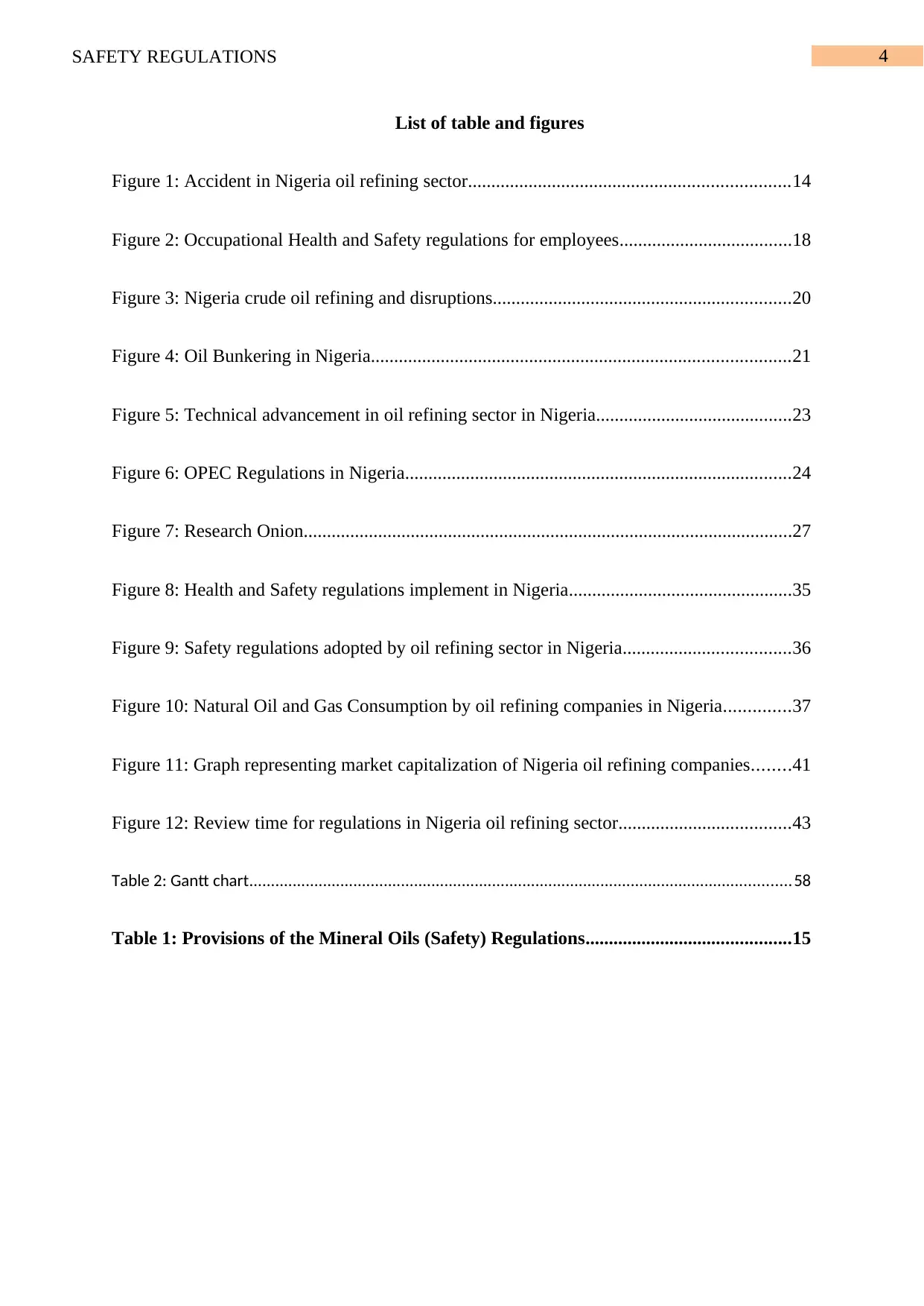
4SAFETY REGULATIONS
List of table and figures
Figure 1: Accident in Nigeria oil refining sector.....................................................................14
Figure 2: Occupational Health and Safety regulations for employees.....................................18
Figure 3: Nigeria crude oil refining and disruptions................................................................20
Figure 4: Oil Bunkering in Nigeria..........................................................................................21
Figure 5: Technical advancement in oil refining sector in Nigeria..........................................23
Figure 6: OPEC Regulations in Nigeria...................................................................................24
Figure 7: Research Onion.........................................................................................................27
Figure 8: Health and Safety regulations implement in Nigeria................................................35
Figure 9: Safety regulations adopted by oil refining sector in Nigeria....................................36
Figure 10: Natural Oil and Gas Consumption by oil refining companies in Nigeria..............37
Figure 11: Graph representing market capitalization of Nigeria oil refining companies........41
Figure 12: Review time for regulations in Nigeria oil refining sector.....................................43
Table 2: Gantt chart.............................................................................................................................58
Table 1: Provisions of the Mineral Oils (Safety) Regulations............................................15
List of table and figures
Figure 1: Accident in Nigeria oil refining sector.....................................................................14
Figure 2: Occupational Health and Safety regulations for employees.....................................18
Figure 3: Nigeria crude oil refining and disruptions................................................................20
Figure 4: Oil Bunkering in Nigeria..........................................................................................21
Figure 5: Technical advancement in oil refining sector in Nigeria..........................................23
Figure 6: OPEC Regulations in Nigeria...................................................................................24
Figure 7: Research Onion.........................................................................................................27
Figure 8: Health and Safety regulations implement in Nigeria................................................35
Figure 9: Safety regulations adopted by oil refining sector in Nigeria....................................36
Figure 10: Natural Oil and Gas Consumption by oil refining companies in Nigeria..............37
Figure 11: Graph representing market capitalization of Nigeria oil refining companies........41
Figure 12: Review time for regulations in Nigeria oil refining sector.....................................43
Table 2: Gantt chart.............................................................................................................................58
Table 1: Provisions of the Mineral Oils (Safety) Regulations............................................15
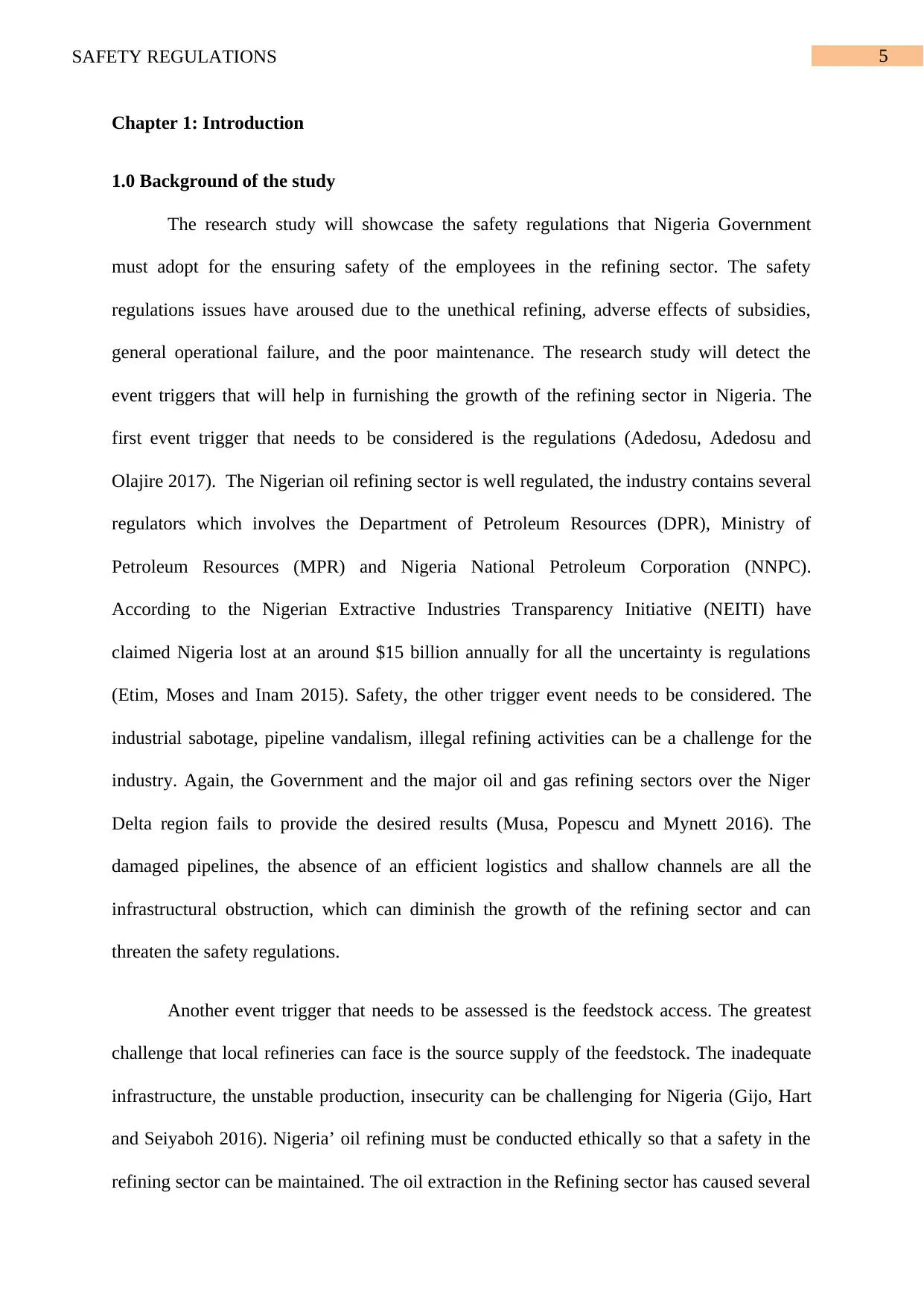
5SAFETY REGULATIONS
Chapter 1: Introduction
1.0 Background of the study
The research study will showcase the safety regulations that Nigeria Government
must adopt for the ensuring safety of the employees in the refining sector. The safety
regulations issues have aroused due to the unethical refining, adverse effects of subsidies,
general operational failure, and the poor maintenance. The research study will detect the
event triggers that will help in furnishing the growth of the refining sector in Nigeria. The
first event trigger that needs to be considered is the regulations (Adedosu, Adedosu and
Olajire 2017). The Nigerian oil refining sector is well regulated, the industry contains several
regulators which involves the Department of Petroleum Resources (DPR), Ministry of
Petroleum Resources (MPR) and Nigeria National Petroleum Corporation (NNPC).
According to the Nigerian Extractive Industries Transparency Initiative (NEITI) have
claimed Nigeria lost at an around $15 billion annually for all the uncertainty is regulations
(Etim, Moses and Inam 2015). Safety, the other trigger event needs to be considered. The
industrial sabotage, pipeline vandalism, illegal refining activities can be a challenge for the
industry. Again, the Government and the major oil and gas refining sectors over the Niger
Delta region fails to provide the desired results (Musa, Popescu and Mynett 2016). The
damaged pipelines, the absence of an efficient logistics and shallow channels are all the
infrastructural obstruction, which can diminish the growth of the refining sector and can
threaten the safety regulations.
Another event trigger that needs to be assessed is the feedstock access. The greatest
challenge that local refineries can face is the source supply of the feedstock. The inadequate
infrastructure, the unstable production, insecurity can be challenging for Nigeria (Gijo, Hart
and Seiyaboh 2016). Nigeria’ oil refining must be conducted ethically so that a safety in the
refining sector can be maintained. The oil extraction in the Refining sector has caused several
Chapter 1: Introduction
1.0 Background of the study
The research study will showcase the safety regulations that Nigeria Government
must adopt for the ensuring safety of the employees in the refining sector. The safety
regulations issues have aroused due to the unethical refining, adverse effects of subsidies,
general operational failure, and the poor maintenance. The research study will detect the
event triggers that will help in furnishing the growth of the refining sector in Nigeria. The
first event trigger that needs to be considered is the regulations (Adedosu, Adedosu and
Olajire 2017). The Nigerian oil refining sector is well regulated, the industry contains several
regulators which involves the Department of Petroleum Resources (DPR), Ministry of
Petroleum Resources (MPR) and Nigeria National Petroleum Corporation (NNPC).
According to the Nigerian Extractive Industries Transparency Initiative (NEITI) have
claimed Nigeria lost at an around $15 billion annually for all the uncertainty is regulations
(Etim, Moses and Inam 2015). Safety, the other trigger event needs to be considered. The
industrial sabotage, pipeline vandalism, illegal refining activities can be a challenge for the
industry. Again, the Government and the major oil and gas refining sectors over the Niger
Delta region fails to provide the desired results (Musa, Popescu and Mynett 2016). The
damaged pipelines, the absence of an efficient logistics and shallow channels are all the
infrastructural obstruction, which can diminish the growth of the refining sector and can
threaten the safety regulations.
Another event trigger that needs to be assessed is the feedstock access. The greatest
challenge that local refineries can face is the source supply of the feedstock. The inadequate
infrastructure, the unstable production, insecurity can be challenging for Nigeria (Gijo, Hart
and Seiyaboh 2016). Nigeria’ oil refining must be conducted ethically so that a safety in the
refining sector can be maintained. The oil extraction in the Refining sector has caused several
⊘ This is a preview!⊘
Do you want full access?
Subscribe today to unlock all pages.

Trusted by 1+ million students worldwide
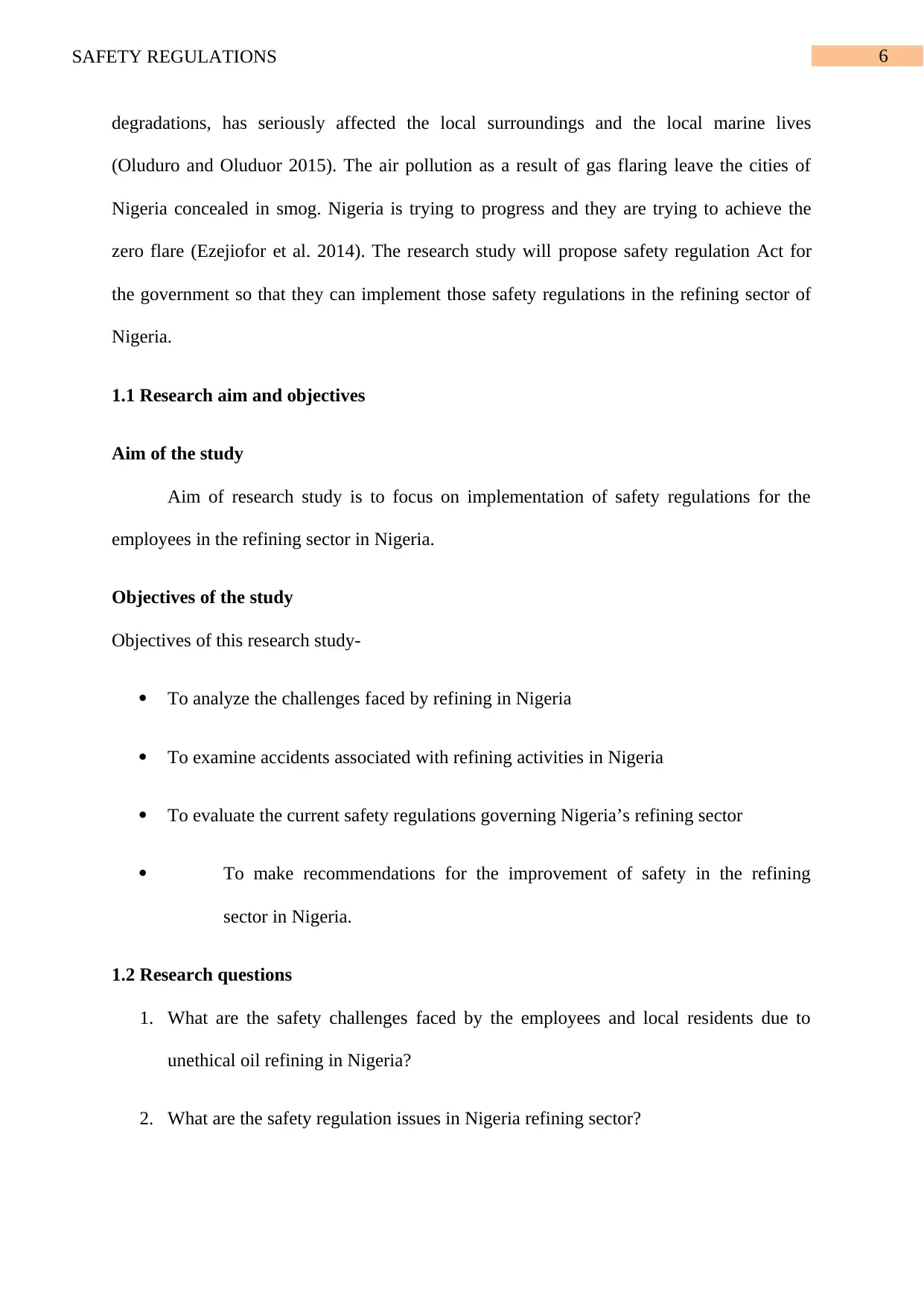
6SAFETY REGULATIONS
degradations, has seriously affected the local surroundings and the local marine lives
(Oluduro and Oluduor 2015). The air pollution as a result of gas flaring leave the cities of
Nigeria concealed in smog. Nigeria is trying to progress and they are trying to achieve the
zero flare (Ezejiofor et al. 2014). The research study will propose safety regulation Act for
the government so that they can implement those safety regulations in the refining sector of
Nigeria.
1.1 Research aim and objectives
Aim of the study
Aim of research study is to focus on implementation of safety regulations for the
employees in the refining sector in Nigeria.
Objectives of the study
Objectives of this research study-
To analyze the challenges faced by refining in Nigeria
To examine accidents associated with refining activities in Nigeria
To evaluate the current safety regulations governing Nigeria’s refining sector
To make recommendations for the improvement of safety in the refining
sector in Nigeria.
1.2 Research questions
1. What are the safety challenges faced by the employees and local residents due to
unethical oil refining in Nigeria?
2. What are the safety regulation issues in Nigeria refining sector?
degradations, has seriously affected the local surroundings and the local marine lives
(Oluduro and Oluduor 2015). The air pollution as a result of gas flaring leave the cities of
Nigeria concealed in smog. Nigeria is trying to progress and they are trying to achieve the
zero flare (Ezejiofor et al. 2014). The research study will propose safety regulation Act for
the government so that they can implement those safety regulations in the refining sector of
Nigeria.
1.1 Research aim and objectives
Aim of the study
Aim of research study is to focus on implementation of safety regulations for the
employees in the refining sector in Nigeria.
Objectives of the study
Objectives of this research study-
To analyze the challenges faced by refining in Nigeria
To examine accidents associated with refining activities in Nigeria
To evaluate the current safety regulations governing Nigeria’s refining sector
To make recommendations for the improvement of safety in the refining
sector in Nigeria.
1.2 Research questions
1. What are the safety challenges faced by the employees and local residents due to
unethical oil refining in Nigeria?
2. What are the safety regulation issues in Nigeria refining sector?
Paraphrase This Document
Need a fresh take? Get an instant paraphrase of this document with our AI Paraphraser
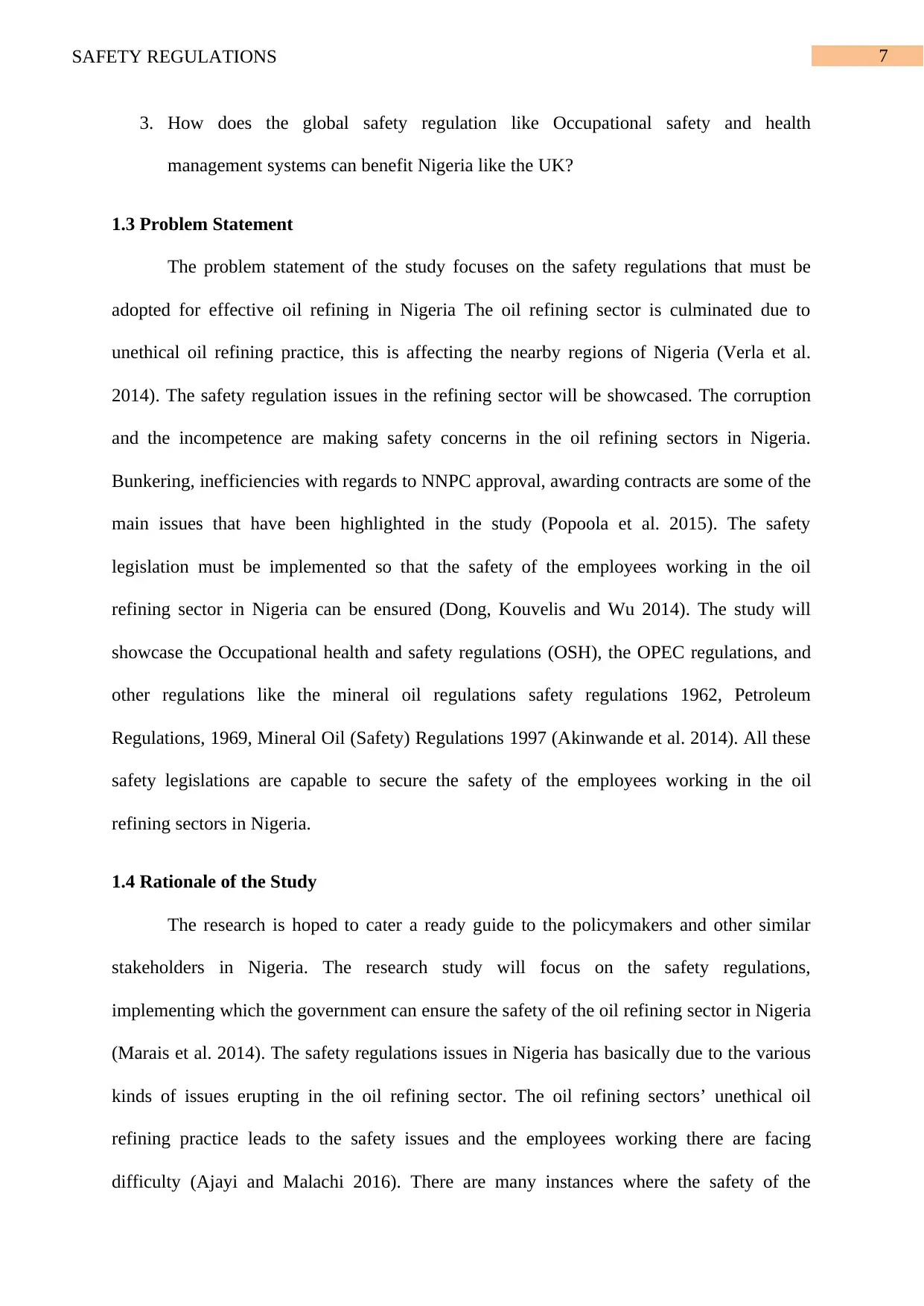
7SAFETY REGULATIONS
3. How does the global safety regulation like Occupational safety and health
management systems can benefit Nigeria like the UK?
1.3 Problem Statement
The problem statement of the study focuses on the safety regulations that must be
adopted for effective oil refining in Nigeria The oil refining sector is culminated due to
unethical oil refining practice, this is affecting the nearby regions of Nigeria (Verla et al.
2014). The safety regulation issues in the refining sector will be showcased. The corruption
and the incompetence are making safety concerns in the oil refining sectors in Nigeria.
Bunkering, inefficiencies with regards to NNPC approval, awarding contracts are some of the
main issues that have been highlighted in the study (Popoola et al. 2015). The safety
legislation must be implemented so that the safety of the employees working in the oil
refining sector in Nigeria can be ensured (Dong, Kouvelis and Wu 2014). The study will
showcase the Occupational health and safety regulations (OSH), the OPEC regulations, and
other regulations like the mineral oil regulations safety regulations 1962, Petroleum
Regulations, 1969, Mineral Oil (Safety) Regulations 1997 (Akinwande et al. 2014). All these
safety legislations are capable to secure the safety of the employees working in the oil
refining sectors in Nigeria.
1.4 Rationale of the Study
The research is hoped to cater a ready guide to the policymakers and other similar
stakeholders in Nigeria. The research study will focus on the safety regulations,
implementing which the government can ensure the safety of the oil refining sector in Nigeria
(Marais et al. 2014). The safety regulations issues in Nigeria has basically due to the various
kinds of issues erupting in the oil refining sector. The oil refining sectors’ unethical oil
refining practice leads to the safety issues and the employees working there are facing
difficulty (Ajayi and Malachi 2016). There are many instances where the safety of the
3. How does the global safety regulation like Occupational safety and health
management systems can benefit Nigeria like the UK?
1.3 Problem Statement
The problem statement of the study focuses on the safety regulations that must be
adopted for effective oil refining in Nigeria The oil refining sector is culminated due to
unethical oil refining practice, this is affecting the nearby regions of Nigeria (Verla et al.
2014). The safety regulation issues in the refining sector will be showcased. The corruption
and the incompetence are making safety concerns in the oil refining sectors in Nigeria.
Bunkering, inefficiencies with regards to NNPC approval, awarding contracts are some of the
main issues that have been highlighted in the study (Popoola et al. 2015). The safety
legislation must be implemented so that the safety of the employees working in the oil
refining sector in Nigeria can be ensured (Dong, Kouvelis and Wu 2014). The study will
showcase the Occupational health and safety regulations (OSH), the OPEC regulations, and
other regulations like the mineral oil regulations safety regulations 1962, Petroleum
Regulations, 1969, Mineral Oil (Safety) Regulations 1997 (Akinwande et al. 2014). All these
safety legislations are capable to secure the safety of the employees working in the oil
refining sectors in Nigeria.
1.4 Rationale of the Study
The research is hoped to cater a ready guide to the policymakers and other similar
stakeholders in Nigeria. The research study will focus on the safety regulations,
implementing which the government can ensure the safety of the oil refining sector in Nigeria
(Marais et al. 2014). The safety regulations issues in Nigeria has basically due to the various
kinds of issues erupting in the oil refining sector. The oil refining sectors’ unethical oil
refining practice leads to the safety issues and the employees working there are facing
difficulty (Ajayi and Malachi 2016). There are many instances where the safety of the
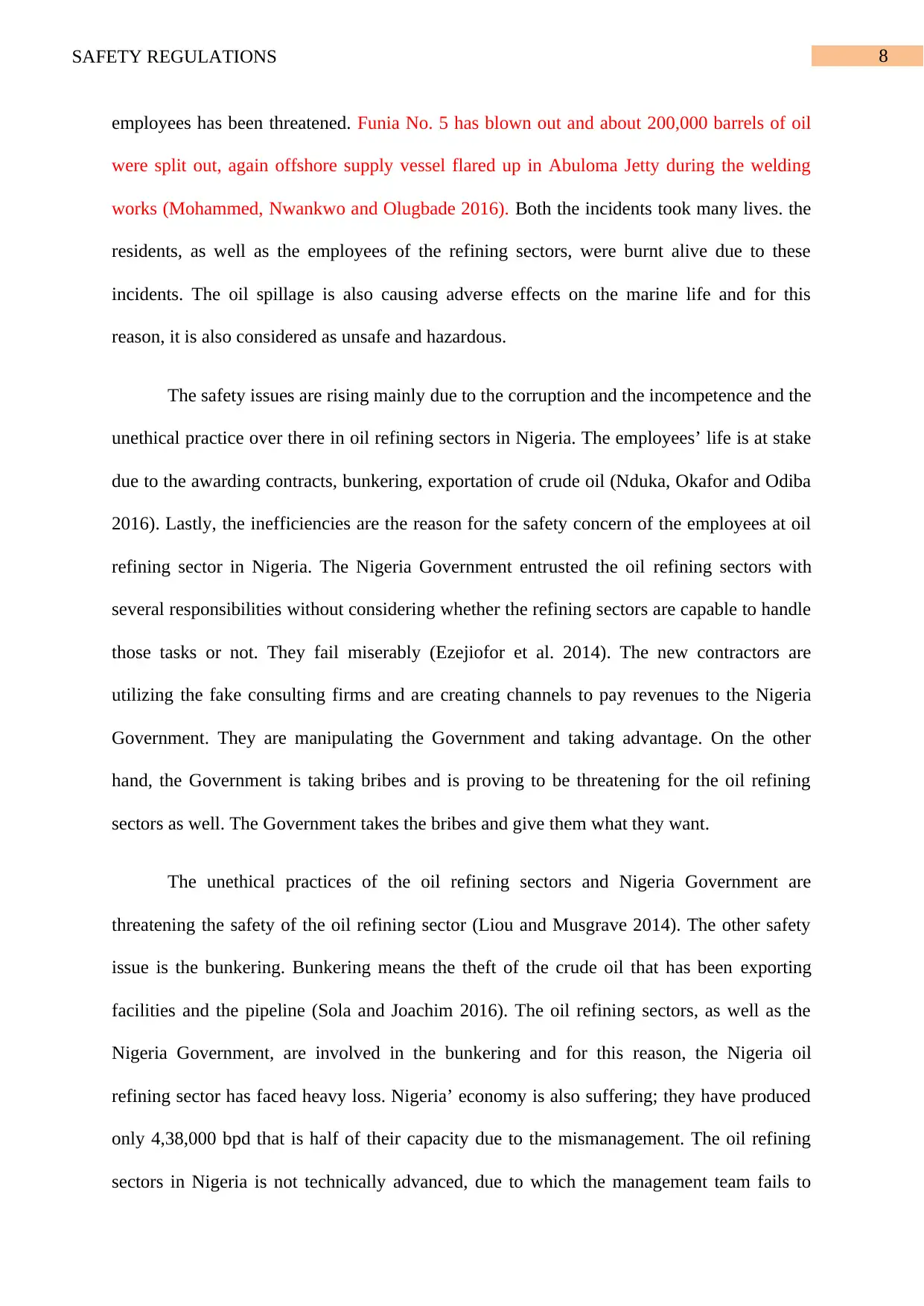
8SAFETY REGULATIONS
employees has been threatened. Funia No. 5 has blown out and about 200,000 barrels of oil
were split out, again offshore supply vessel flared up in Abuloma Jetty during the welding
works (Mohammed, Nwankwo and Olugbade 2016). Both the incidents took many lives. the
residents, as well as the employees of the refining sectors, were burnt alive due to these
incidents. The oil spillage is also causing adverse effects on the marine life and for this
reason, it is also considered as unsafe and hazardous.
The safety issues are rising mainly due to the corruption and the incompetence and the
unethical practice over there in oil refining sectors in Nigeria. The employees’ life is at stake
due to the awarding contracts, bunkering, exportation of crude oil (Nduka, Okafor and Odiba
2016). Lastly, the inefficiencies are the reason for the safety concern of the employees at oil
refining sector in Nigeria. The Nigeria Government entrusted the oil refining sectors with
several responsibilities without considering whether the refining sectors are capable to handle
those tasks or not. They fail miserably (Ezejiofor et al. 2014). The new contractors are
utilizing the fake consulting firms and are creating channels to pay revenues to the Nigeria
Government. They are manipulating the Government and taking advantage. On the other
hand, the Government is taking bribes and is proving to be threatening for the oil refining
sectors as well. The Government takes the bribes and give them what they want.
The unethical practices of the oil refining sectors and Nigeria Government are
threatening the safety of the oil refining sector (Liou and Musgrave 2014). The other safety
issue is the bunkering. Bunkering means the theft of the crude oil that has been exporting
facilities and the pipeline (Sola and Joachim 2016). The oil refining sectors, as well as the
Nigeria Government, are involved in the bunkering and for this reason, the Nigeria oil
refining sector has faced heavy loss. Nigeria’ economy is also suffering; they have produced
only 4,38,000 bpd that is half of their capacity due to the mismanagement. The oil refining
sectors in Nigeria is not technically advanced, due to which the management team fails to
employees has been threatened. Funia No. 5 has blown out and about 200,000 barrels of oil
were split out, again offshore supply vessel flared up in Abuloma Jetty during the welding
works (Mohammed, Nwankwo and Olugbade 2016). Both the incidents took many lives. the
residents, as well as the employees of the refining sectors, were burnt alive due to these
incidents. The oil spillage is also causing adverse effects on the marine life and for this
reason, it is also considered as unsafe and hazardous.
The safety issues are rising mainly due to the corruption and the incompetence and the
unethical practice over there in oil refining sectors in Nigeria. The employees’ life is at stake
due to the awarding contracts, bunkering, exportation of crude oil (Nduka, Okafor and Odiba
2016). Lastly, the inefficiencies are the reason for the safety concern of the employees at oil
refining sector in Nigeria. The Nigeria Government entrusted the oil refining sectors with
several responsibilities without considering whether the refining sectors are capable to handle
those tasks or not. They fail miserably (Ezejiofor et al. 2014). The new contractors are
utilizing the fake consulting firms and are creating channels to pay revenues to the Nigeria
Government. They are manipulating the Government and taking advantage. On the other
hand, the Government is taking bribes and is proving to be threatening for the oil refining
sectors as well. The Government takes the bribes and give them what they want.
The unethical practices of the oil refining sectors and Nigeria Government are
threatening the safety of the oil refining sector (Liou and Musgrave 2014). The other safety
issue is the bunkering. Bunkering means the theft of the crude oil that has been exporting
facilities and the pipeline (Sola and Joachim 2016). The oil refining sectors, as well as the
Nigeria Government, are involved in the bunkering and for this reason, the Nigeria oil
refining sector has faced heavy loss. Nigeria’ economy is also suffering; they have produced
only 4,38,000 bpd that is half of their capacity due to the mismanagement. The oil refining
sectors in Nigeria is not technically advanced, due to which the management team fails to
⊘ This is a preview!⊘
Do you want full access?
Subscribe today to unlock all pages.

Trusted by 1+ million students worldwide
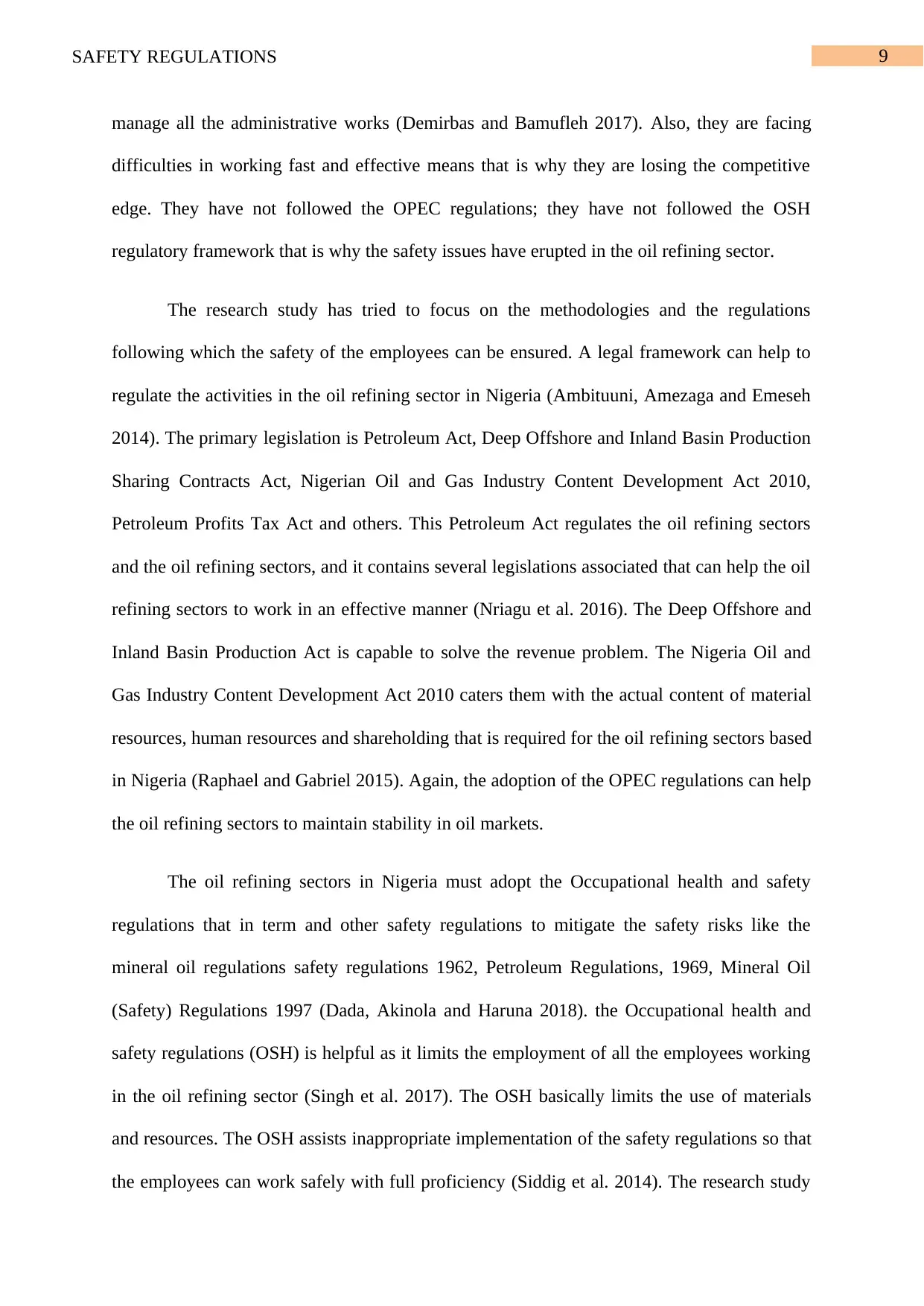
9SAFETY REGULATIONS
manage all the administrative works (Demirbas and Bamufleh 2017). Also, they are facing
difficulties in working fast and effective means that is why they are losing the competitive
edge. They have not followed the OPEC regulations; they have not followed the OSH
regulatory framework that is why the safety issues have erupted in the oil refining sector.
The research study has tried to focus on the methodologies and the regulations
following which the safety of the employees can be ensured. A legal framework can help to
regulate the activities in the oil refining sector in Nigeria (Ambituuni, Amezaga and Emeseh
2014). The primary legislation is Petroleum Act, Deep Offshore and Inland Basin Production
Sharing Contracts Act, Nigerian Oil and Gas Industry Content Development Act 2010,
Petroleum Profits Tax Act and others. This Petroleum Act regulates the oil refining sectors
and the oil refining sectors, and it contains several legislations associated that can help the oil
refining sectors to work in an effective manner (Nriagu et al. 2016). The Deep Offshore and
Inland Basin Production Act is capable to solve the revenue problem. The Nigeria Oil and
Gas Industry Content Development Act 2010 caters them with the actual content of material
resources, human resources and shareholding that is required for the oil refining sectors based
in Nigeria (Raphael and Gabriel 2015). Again, the adoption of the OPEC regulations can help
the oil refining sectors to maintain stability in oil markets.
The oil refining sectors in Nigeria must adopt the Occupational health and safety
regulations that in term and other safety regulations to mitigate the safety risks like the
mineral oil regulations safety regulations 1962, Petroleum Regulations, 1969, Mineral Oil
(Safety) Regulations 1997 (Dada, Akinola and Haruna 2018). the Occupational health and
safety regulations (OSH) is helpful as it limits the employment of all the employees working
in the oil refining sector (Singh et al. 2017). The OSH basically limits the use of materials
and resources. The OSH assists inappropriate implementation of the safety regulations so that
the employees can work safely with full proficiency (Siddig et al. 2014). The research study
manage all the administrative works (Demirbas and Bamufleh 2017). Also, they are facing
difficulties in working fast and effective means that is why they are losing the competitive
edge. They have not followed the OPEC regulations; they have not followed the OSH
regulatory framework that is why the safety issues have erupted in the oil refining sector.
The research study has tried to focus on the methodologies and the regulations
following which the safety of the employees can be ensured. A legal framework can help to
regulate the activities in the oil refining sector in Nigeria (Ambituuni, Amezaga and Emeseh
2014). The primary legislation is Petroleum Act, Deep Offshore and Inland Basin Production
Sharing Contracts Act, Nigerian Oil and Gas Industry Content Development Act 2010,
Petroleum Profits Tax Act and others. This Petroleum Act regulates the oil refining sectors
and the oil refining sectors, and it contains several legislations associated that can help the oil
refining sectors to work in an effective manner (Nriagu et al. 2016). The Deep Offshore and
Inland Basin Production Act is capable to solve the revenue problem. The Nigeria Oil and
Gas Industry Content Development Act 2010 caters them with the actual content of material
resources, human resources and shareholding that is required for the oil refining sectors based
in Nigeria (Raphael and Gabriel 2015). Again, the adoption of the OPEC regulations can help
the oil refining sectors to maintain stability in oil markets.
The oil refining sectors in Nigeria must adopt the Occupational health and safety
regulations that in term and other safety regulations to mitigate the safety risks like the
mineral oil regulations safety regulations 1962, Petroleum Regulations, 1969, Mineral Oil
(Safety) Regulations 1997 (Dada, Akinola and Haruna 2018). the Occupational health and
safety regulations (OSH) is helpful as it limits the employment of all the employees working
in the oil refining sector (Singh et al. 2017). The OSH basically limits the use of materials
and resources. The OSH assists inappropriate implementation of the safety regulations so that
the employees can work safely with full proficiency (Siddig et al. 2014). The research study
Paraphrase This Document
Need a fresh take? Get an instant paraphrase of this document with our AI Paraphraser
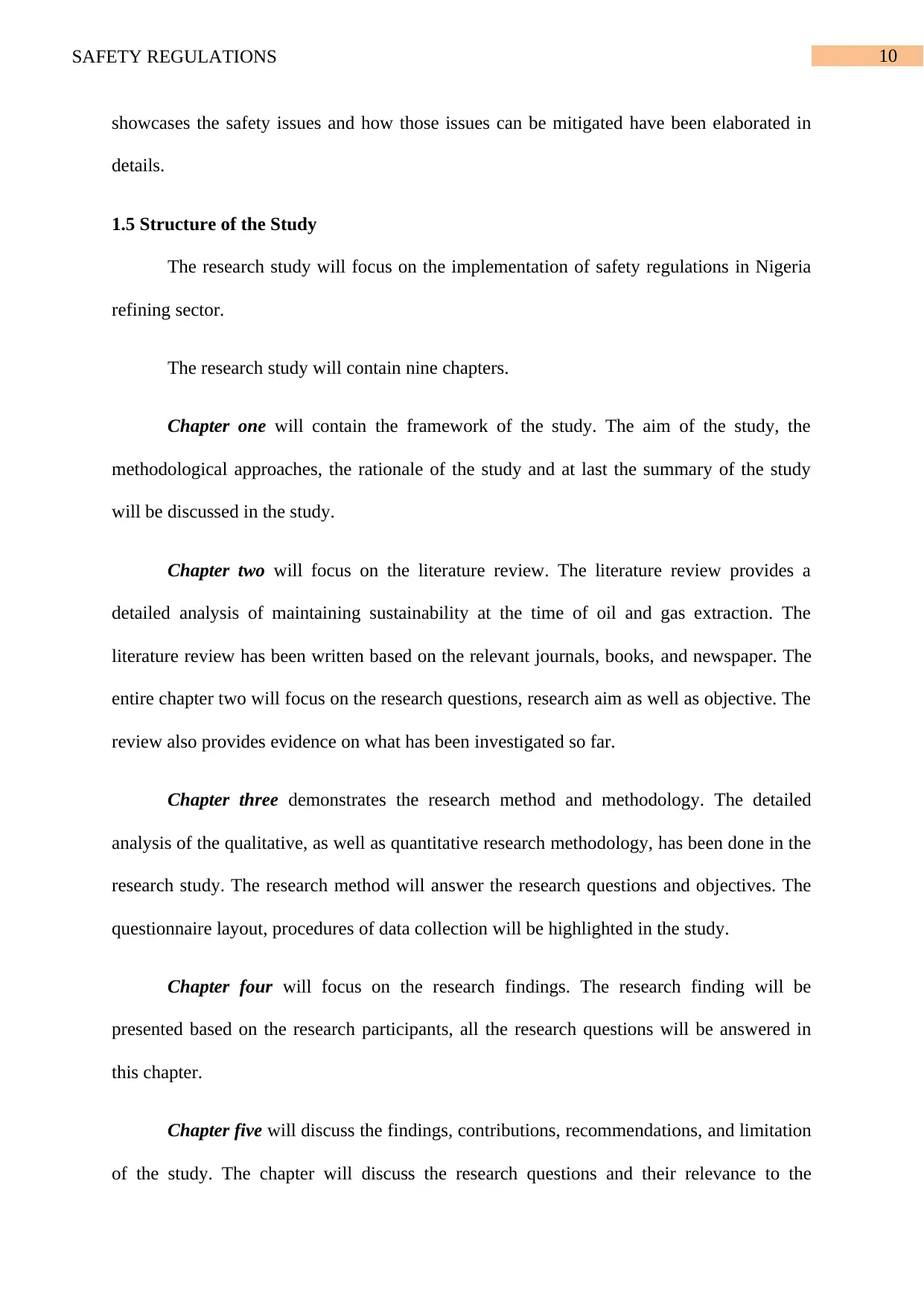
10SAFETY REGULATIONS
showcases the safety issues and how those issues can be mitigated have been elaborated in
details.
1.5 Structure of the Study
The research study will focus on the implementation of safety regulations in Nigeria
refining sector.
The research study will contain nine chapters.
Chapter one will contain the framework of the study. The aim of the study, the
methodological approaches, the rationale of the study and at last the summary of the study
will be discussed in the study.
Chapter two will focus on the literature review. The literature review provides a
detailed analysis of maintaining sustainability at the time of oil and gas extraction. The
literature review has been written based on the relevant journals, books, and newspaper. The
entire chapter two will focus on the research questions, research aim as well as objective. The
review also provides evidence on what has been investigated so far.
Chapter three demonstrates the research method and methodology. The detailed
analysis of the qualitative, as well as quantitative research methodology, has been done in the
research study. The research method will answer the research questions and objectives. The
questionnaire layout, procedures of data collection will be highlighted in the study.
Chapter four will focus on the research findings. The research finding will be
presented based on the research participants, all the research questions will be answered in
this chapter.
Chapter five will discuss the findings, contributions, recommendations, and limitation
of the study. The chapter will discuss the research questions and their relevance to the
showcases the safety issues and how those issues can be mitigated have been elaborated in
details.
1.5 Structure of the Study
The research study will focus on the implementation of safety regulations in Nigeria
refining sector.
The research study will contain nine chapters.
Chapter one will contain the framework of the study. The aim of the study, the
methodological approaches, the rationale of the study and at last the summary of the study
will be discussed in the study.
Chapter two will focus on the literature review. The literature review provides a
detailed analysis of maintaining sustainability at the time of oil and gas extraction. The
literature review has been written based on the relevant journals, books, and newspaper. The
entire chapter two will focus on the research questions, research aim as well as objective. The
review also provides evidence on what has been investigated so far.
Chapter three demonstrates the research method and methodology. The detailed
analysis of the qualitative, as well as quantitative research methodology, has been done in the
research study. The research method will answer the research questions and objectives. The
questionnaire layout, procedures of data collection will be highlighted in the study.
Chapter four will focus on the research findings. The research finding will be
presented based on the research participants, all the research questions will be answered in
this chapter.
Chapter five will discuss the findings, contributions, recommendations, and limitation
of the study. The chapter will discuss the research questions and their relevance to the
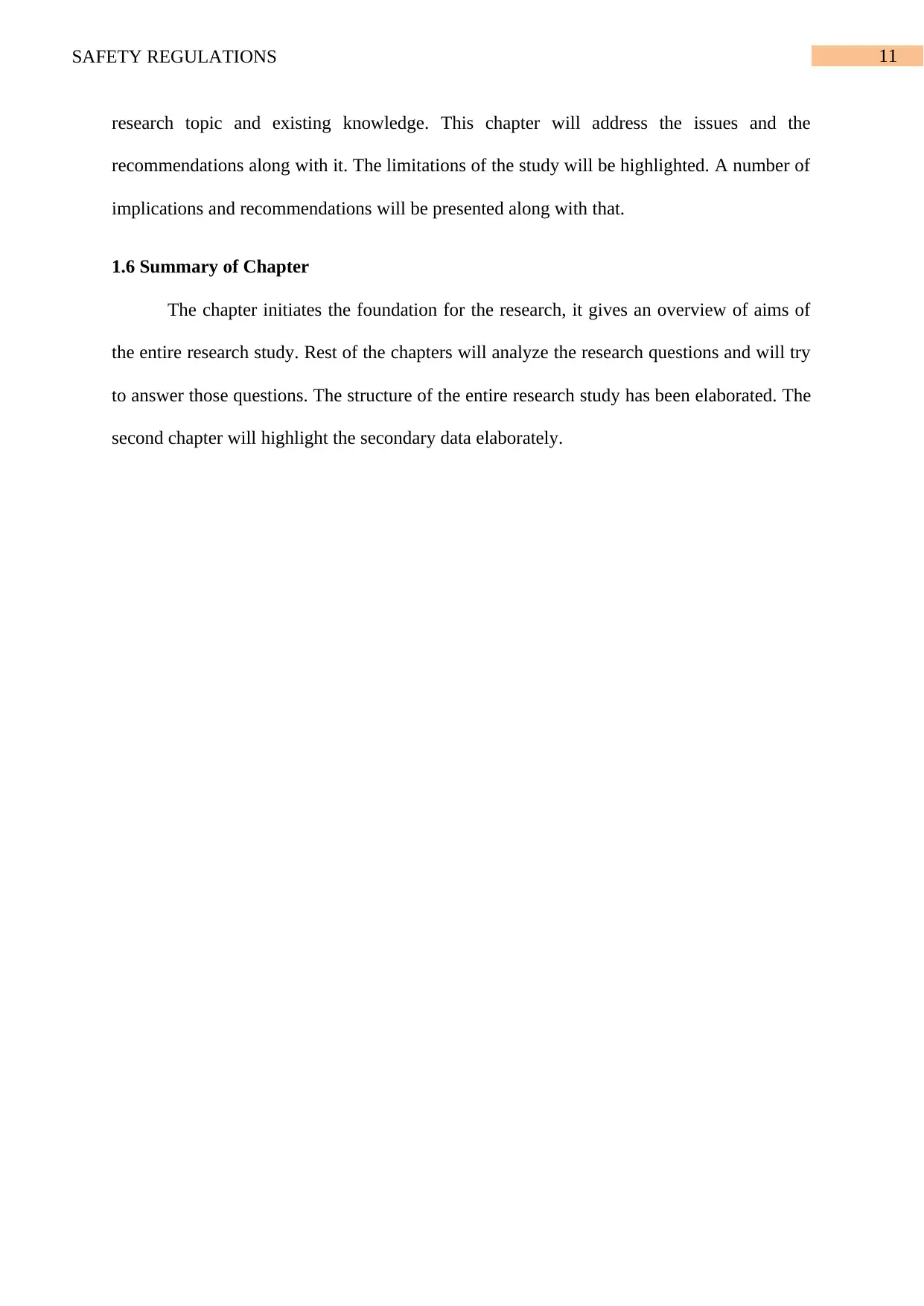
11SAFETY REGULATIONS
research topic and existing knowledge. This chapter will address the issues and the
recommendations along with it. The limitations of the study will be highlighted. A number of
implications and recommendations will be presented along with that.
1.6 Summary of Chapter
The chapter initiates the foundation for the research, it gives an overview of aims of
the entire research study. Rest of the chapters will analyze the research questions and will try
to answer those questions. The structure of the entire research study has been elaborated. The
second chapter will highlight the secondary data elaborately.
research topic and existing knowledge. This chapter will address the issues and the
recommendations along with it. The limitations of the study will be highlighted. A number of
implications and recommendations will be presented along with that.
1.6 Summary of Chapter
The chapter initiates the foundation for the research, it gives an overview of aims of
the entire research study. Rest of the chapters will analyze the research questions and will try
to answer those questions. The structure of the entire research study has been elaborated. The
second chapter will highlight the secondary data elaborately.
⊘ This is a preview!⊘
Do you want full access?
Subscribe today to unlock all pages.

Trusted by 1+ million students worldwide
1 out of 61
Related Documents
Your All-in-One AI-Powered Toolkit for Academic Success.
+13062052269
info@desklib.com
Available 24*7 on WhatsApp / Email
![[object Object]](/_next/static/media/star-bottom.7253800d.svg)
Unlock your academic potential
Copyright © 2020–2026 A2Z Services. All Rights Reserved. Developed and managed by ZUCOL.





